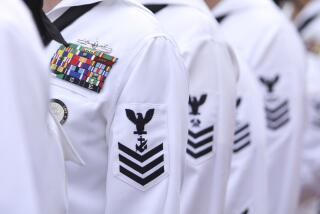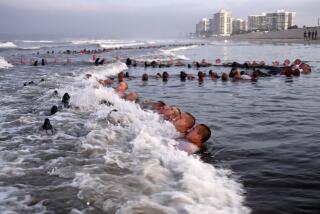Servicemen at Risk, Navy Doctor Says : U.S. Accused of Ignoring Philippine AIDS Problem
- Share via
MANILA — Thousands of U.S. Navy personnel recently disembarked from the battleship Missouri and its support ships at Subic Bay Naval Base north of Manila for rest and relaxation before steaming off to the Persian Gulf war zone, where underwater mines have proven to be a hazard.
In doing so, the men were entering a danger zone of a different kind, one where the menace is AIDS, according to Lt. Cmdr. Thomas O’Rourke, a 34-year-old Navy physician.
O’Rourke said that each year, thousands of American sailors are allowed to go on liberty in a town where the Navy’s own research has found that more than three dozen prostitutes, who continue to have contact with American military personnel, have been exposed to the virus of acquired immune deficiency syndrome.
O’Rourke, who has spent the last two years doing AIDS research in the Philippines, said Navy officials even know the names of the women who have tested positive for exposure to AIDS and of the bars where they work in Olongapo, the honky-tonk town that borders the Subic Bay base.
Yet, the Navy does not warn its liberty-bound sailors about these women and the places they work, O’Rourke said, nor has it tried to rehabilitate the women by getting them into another line of work.
“It all comes down to the American military not wanting to take any responsibility for introducing the AIDS virus into the Philippines,” said O’Rourke, who is still an active-duty naval officer but faces a court-martial hearing next month for technical violations related to his AIDS research.
“To me,” he added, “the most outrageous thing is that our military commanders knowingly are exposing our boys to this fatal virus without even telling them that it’s out there.”
That is among the least controversial of O’Rourke’s criticisms of the U.S. military’s handling of the AIDS problem in the Philippines, a strategic nation where the United States maintains its two largest military bases overseas.
Based on a two-year study of AIDS in the Philippines, O’Rourke and several Philippine Health Department officials said they have concluded that the two U.S. military bases north of Manila are primarily responsible for bringing AIDS into this country, where experts say the disease could become an epidemic in the coming years. The study was financed by a $750,000 U.S. Navy grant administered by the Navy Medical Research Unit in Manila, headed by O’Rourke.
The U.S. government has officially denied the assertions. Navy officials said that the AIDS study program, in which O’Rourke and his co-workers tested thousands of prostitutes throughout the nation, was part of general epidemiological testing for diseases that military personnel are exposed to here, including malaria, encephalitis and cholera. It was not undertaken, they said, to try to ascertain the source of the AIDS virus.
The issue is potentially explosive because bilateral negotiations are scheduled to begin next year on whether the American bases will remain in the Philippines beyond 1991, when the current status-of-forces agreement between the two countries expires.
Strongly Nationalistic
The new Philippine Senate, which must approve any new treaty for the bases, has a strongly nationalistic character. It has already begun deliberations on two bills that would bar nuclear weapons and nuclear-powered ships from Philippine territory, a development that many analysts believe would make it impossible to keep U.S. bases in the Philippines.
“Negotiations on the bases begin next year, and I’m sure AIDS will be a very important issue,” O’Rourke’s civilian attorney, Richard Walden of Los Angeles, said at a press conference here last week.
In telling the Philippine press about O’Rourke’s case, Walden said Navy regulations prevent O’Rourke from talking personally to foreign media representatives, a violation that he said could expose the medical officer to severe punishment.
However, in recent interviews with The Times, O’Rourke said that his is the only case he knows about in which a doctor is being prosecuted for protecting the confidentiality of AIDS victims.
Names Falsified
O’Rourke, a native of Hawaii, is charged in his court-martial with falsifying the names on 58 prescriptions that he wrote for prostitutes testing positive for exposure to the AIDS virus in Olongapo and Angeles, the latter a city next to Clark Air Base, the other big U.S. military installation here.
O’Rourke said he changed the women’s names to protect them and to attempt to control the spread of the virus after an Air Force technician noticed the real name of one of O’Rourke’s patients on one of his prescriptions and reported it to her employer, who fired her as a bar hostess.
“If we (the Navy) aren’t going to help rehabilitate these girls, at the very least we have to keep track of them,” O’Rourke said. “That’s the only hope in controlling the spread of AIDS. If we lose them into the general population, they’re gone forever.
“And it’s very difficult to win the trust of these girls,” O’Rourke said of the 44 prostitutes who his testing confirmed were carriers of the AIDS virus. “To help gain that trust, the (Navy research) doctors have been treating them for a whole host of illnesses not related to AIDS. Once they trusted us, they reported in routinely, so at least we knew where they were.
“Now, I’m afraid this whole thing will get out of hand.”
Testing Program to End
During his press conference last week, attorney Walden said that he was told by two of O’Rourke’s colleagues that the Navy’s AIDS testing program in the Philippines will be discontinued permanently later this year, a development that he said would accelerate the spread of the virus.
Top assistants to Philippine Health Secretary Alfredo Bengzon said that they, too, have been told unofficially that U.S. funds for the screening program will be cut, but one senior health department official said the government hopes to continue testing through a grant from the World Health Organization.
O’Rourke said that the testing program, which he described as the largest study ever undertaken on heterosexual transmission of AIDS, convinced him and health department officials that the virus was introduced into the country through the American bases.
According to the results of the testing, made available to the The Times by Philippine government health officials, doctors had tested blood samples from 41,927 female prostitutes nationwide as of March 6, 1987.
Tests Pointed to U.S. Bases
The largest number of samples were taken from women at Olongapo and Angeles, the two towns nearest the bases, where 26,038 tests for the AIDS virus were administered. Those towns also have the largest number of licensed bar girls and prostitutes, government statistics show.
The results showed that 37 of the 44 women who tested positive for the AIDS virus lived or worked in either Olongapo or Angeles. Two AIDS-positive women discovered in Manila’s tourist district, where 5,619 prostitutes were tested, had previously worked in the two base towns, as had the five other positive cases found in five other provincial capitals.
“Obviously, more testing has to be done to be certain, but, based on the results so far--and this is the largest single study of its kind--I’m convinced the (American) bases are the contact point for the virus in this country,” O’Rourke said.
The U.S. military routinely tests all servicemen for AIDS. Last year, Defense Secretary Caspar W. Weinberger said that 1,600 active-duty service personnel had tested positive. Defense Department officials have refused to say how many of those cases, if any, were found at Clark or Subic.
Confidential Documents
Officially, the Navy has not commented on O’Rourke’s case, aside from insisting that the findings of his research are considered confidential Navy documents.
O’Rourke said he believes that the charges pending against him are motivated, in part, by politics--an attempt to discredit medical findings adverse to U.S. interests here by discrediting him.
“My troubles all started last year when I proposed that the Navy finance the rehabilitation of these girls (testing positive for AIDS),” he said. “I suggested we pay for their education or capital to get them into another profession. When the answer came back, it was ‘absolutely not.’ I was told that if the Navy helped these girls, we would be admitting we were responsible for their being infected.”
Investigative documents in O’Rourke’s case obtained by The Times indicate that many U.S. Navy officials familiar with the case agreed that the charges against him are weak.
Internal Report
In an official internal Navy report dated July 20, a Marine Corps officer who investigated O’Rourke’s case concluded: “The evidence on many of the allegations was very vague. . . . The evidence also does not support any criminal prosecution.”
The officer said that O’Rourke had falsified the names on 58 prescriptions for AIDS victims, but he added, “The accused’s motives were to serve his patients.”
A letter dated Aug. 3 from the staff judge advocate to the commander of Subic Bay Naval Base, which recommended that O’Rourke be court-martialed, said that the doctor “acted out of humanitarian motives” in writing the prescriptions. But it added, “His actions were not legally permissible, justified or authorized.”
More to Read
Sign up for Essential California
The most important California stories and recommendations in your inbox every morning.
You may occasionally receive promotional content from the Los Angeles Times.













